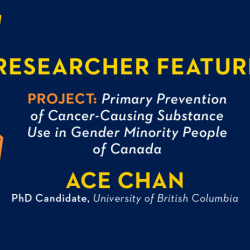The Government of Canada highlights progress on breast cancer screening research and implementation in Canada
News release Ottawa, Ontario | Public Health Agency of Canada Breast cancer is one of the most common forms of cancer and the second leading cause of cancer-related deaths among women. One in eight women in Canada is expected to be diagnosed with breast cancer in their lifetime. Raising awareness of breast cancer screening, which aims to detect cancer at an earlier, more treatable stage, is a priority for the Government of Canada. The Government of Canada is committed to supporting the health of women by addressing knowledge gaps in breast cancer screening and prevention. The Public Health Agency of Canada (PHAC), in collaboration with federal, provincial and territorial experts and stakeholders, hosted the event Closing the Gap: Action for Equity in Breast Cancer Screening. This event discussed improving accessibility and inclusivity in breast cancer screening, especially for underserved populations. Participants shared lessons learned and best practices that will be compiled into a resource guide that will be shared broadly across all jurisdictions to help improve equitable implementation of breast cancer screening in Canada. PHAC is working closely with Statistics Canada to conduct analyses of national cancer trends, including examining differences in breast cancer rates based on where people live, their age and ethnicity. This will support informed and data driven breast cancer screening policy. The Canadian Institutes of Health Research (CIHR) and partners have developed a multi-disciplinary roadmap that identifies research gaps for breast cancer screening and provides recommendations to guide future research activities in Canada. The roadmap summarizes what was heard from partners alongside key research areas and strategies to support breast cancer research in Canada. The Government of Canada is also working directly with our partners, like the Canadian Partnership for Tomorrow’s Health and the Canadian Cancer Society, to generate better data to inform breast cancer screening practices and raise awareness of its importance in Canada. Together, these initiatives support collaborative and scientific research, data collection, and public health guidance for breast cancer screening in Canada. Quotes “I would like to thank our partners and stakeholders for their commitment to overcome barriers and improve access to breast cancer screening in Canada. Awareness and access to breast cancer screening will make life changing differences for the health of Canadians.” The Honourable Mark Holland Minister of Health “Breast cancer touches the lives of so many, either through a personal diagnosis or that of a loved one. Through this work and the dedication of our partners, we are taking important steps to safeguard women’s physical and mental health.” The Honourable Ya’ara Saks Minister of Mental Health and Addictions and Associate Minister of Health Quick facts Breast cancer is the second most common cancer in women living in Canada, after non-melanoma skin cancer. While it can also be found in men, male breast cancer is a very rare occurrence. Breast cancer screening is used to detect cancer in people who do not have any signs or symptoms. This differs from diagnostic testing, which is used when someone does have signs or symptoms (e.g., a lump). The Government of Canada recognizes and respects that each province and territory has unique needs and different approaches to breast cancer screening. Provincial and territorial governments are responsible for diagnosis, treatment, services, programming and education. Associated links Canadian Cancer Society – Get your mammogram Canadian Partnership For Tomorrow’s Health Government of Canada invests in breast cancer research and public awareness Contacts Matthew Kronberg Press Secretary Office of the Honourable Mark Holland Minister of Health 343-552-5654 Callum Haney Press Secretary Office of the Honourable Ya’ara Saks Minister of Mental Health and Addictions and Associate Minister of Health 343-576-4407 Media Relations Health Canada 613-957-2983 media@hc-sc.gc.ca Public Inquiries 613-957-2991 1-866-225-0709







